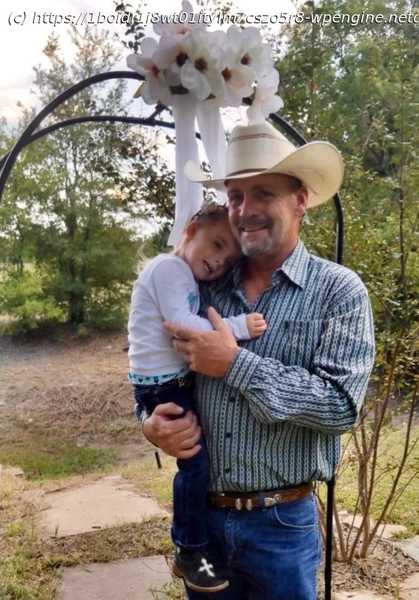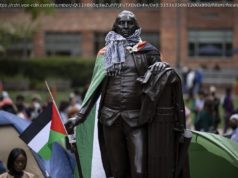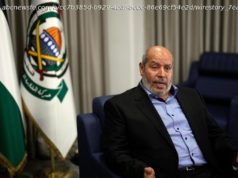In early June, peaceful protests in Alamosa turned violent after a driver tried to push through the intersection and a protester shot him.
ALAMOSA — The protesters, about a dozen in all, gathered on June 4 in the intersection of State Avenue and Main Street. Like protesters across the country in the aftermath of George Floyd’s killing by police, they were demanding police accountability and racial justice.
The group occupied the crosswalk during red lights, then stepped to the curb on green. Letting traffic pass, they figured, would help keep things peaceful.
Some drivers raised their fists and honked in solidarity. Others, cranky that skinny-jeaned millennials were chanting “Whose streets? Our streets” in their city’s main intersection, flipped them the bird.
In the days before the protest, warnings of outside agitators coming in to make trouble prompted a posse of armed businessmen to stand post. People were on edge.
Just before 6 p.m., a man driving a Dodge Ram pickup pulled up to the red light, then accelerated into the crosswalk.
A video of the scene shows protesters lurch out of the way. It also shows one protester, a white man dressed in black, pull a gun from his waistband and shoot the driver in the head.
Their June 4 run-in lasted five seconds, less than an average yawn. That’s all it took for one of Colorado’s sleepy protests to become its most violent.
James Edward Marshall IV, the 27-year-old shooter, is facing a slew of charges, including attempted murder. He knows a thing or two about what he’s up against because he is a defense lawyer.
Marshall grew up in Cincinnati’s suburbs and studied political science at Ohio State University where, as he still touts years later, he was the president of the rifle and “cigar culture” clubs. He graduated in 2018 from the University of Colorado Law School. A former classmate in the student law clinic there says he would bemoan police and prosecutors’ treatment of his clients more loudly and bitterly than others.
He went to work at the public defender’s office in Durango, a job he kept for only 10 months. In June 2019, he married CU grad Mariah Loraine and moved to Alamosa. She took a job as a child welfare caseworker for the county’s Department of Human Services and he opened a law office at the corner where he would shoot Pruitt a year later.
Photo of James Marshall from his law practice’s web site.
He called his practice “Marshall Law.”
His goal, he told people here, was to represent clients at fees they wouldn’t need to sell their homes to afford.
“He thought there was a niche in this area that he could fulfill. He seemed to have the mindset of being of service and wanting to really establish himself,” said Christine Canaly, director of the San Luis Valley Ecosystem Council whose office is next to the one Marshall rented.
Canaly has seen tenants come and go in her two decades working in the building. He was the first to tidy up the joint restroom. He even brought a “little wicker basket to make it homey,” she said. “I thought, ‘Wow, this is great!’”
She found him friendly when he would pop in to say hi, but also says he seemed “stressed out” and has a “nervous temperament.”
Marshall played a lot of trivia at Square Peg, a downtown brewery. He also frequented Milagros Café, the popular coffee spot below his office. He sometimes met clients there, though usually grabbed a cup to go while on his cell phone. Customers say he is a loud talker. Some also say his tailored suits and matching dress shoes and belts stood out in a town more accustomed to jeans and work boots.
Over the past year, he struck up several conversations with Aaron Miltenberger, executive director of Boys & Girls Clubs of the San Luis Valley. They would chat while waiting for their coffee orders.
“We’d run into each other and talk about news, politics, whatever. The conversation would often be around the current political state. He’d say ‘I f—ing hate Trump,’ or something like that,” he said.
“James is pretty tightly wound. There’s an intensity you don’t always see around here.”
Danny Pruitt, the 49-year-old gunshot victim, spent most of the past three weeks in a coma, the bullet still lodged in his brain.
Named after his dad, he grew up in Maypearl, a town of 1,000 in Texas’s cow country. He served as an electronics tech in the Army after Operation Desert Storm and fell 15 feet on the job, hurting his shoulder and back, before being discharged for disability. He has not worked since, says Tom Metier, his lawyer.
Pruitt’s friends and family say he is fiercely private, unwilling to talk much about his life.
“I didn’t ask, he didn’t tell,” said Brent Thompson, the neighbor he was with in the hours before the shooting.
Records show Pruitt made a long string of moves within Texas before heading to Colorado in 2018. He stayed for a while in a small home near a cemetery in Cañon City, then moved to an RV Park in Blanca with a view of the snow-capped Fourteener of the same name. The mountain, he told people, reminded him there is a God.
About a year ago, he bought seven acres of cheap land at the far eastern edge of the San Luis Valley. The off-grid community called Sangre de Cristo Ranches has drawn many Texans and Oklahomans, off-roaders and gun people, and at least two residents who recently were using Confederate flags as window coverings.
Pruitt spent much of the past year preparing to build a small cabin on the property where he could live with his 5-year-old daughter, Melody. He also was battling for custody with her mother in Texas until being granted primary custody in the winter.
Danny Pruitt and his daughter, Melody, who is now five. She was with her mother in Texas the day of his shooting. (Photo courtesy of Pruitt family)
“All he wanted was to get away and build a better life for that girl,” his sister, Candace said.
Thompson, a preacher who lives down the hill from Pruitt, counseled his new friend through the rough patch. Both are veterans who share a similar “appreciation of this land, of this country,” he said.
He describes Pruitt as “your typical Texan — a cowboy-hat-wearing, pickup truck-driving, downhome, morally sound kind of person” committed, above all else, to his daughter. “The very first thing he built up there is a room for her to be in, a safe place for her while he’s working.”
“All I know is he and the mom of his daughter got into some bad stuff and he seems to have some hard times in the past down (in) Texas. He’s like a lot of people who’ve had bad marriages, bad lives, done things they’re not necessarily proud of.”
Pruitt posted a selfie on Facebook in mid-May. In it, he wore the white cowboy hat Thompson says he saves for trips into town. He was standing next to his pickup on what looks like his property, layers of foothills and the valley behind him. He looked proud. And he was smiling.
“Been here with god (a) while now. Ain’t no way I’m leaving,” he wrote. “I’ll raise my daughter and build things back in my life. Home this is home!”
The May 25th killing of George Floyd, who was Black, by a white Minneapolis police officer set off a national soul-searching, and public officials across Colorado responded. Leaders of dozens of cities, both big and small, recognized widespread frustrations about police brutality and institutional racism. They acknowledged people’s pain. They promised to look at their own communities’ policies and practices, and make changes, if needed.
City brass in Alamosa said nothing.
“We do not have the big city issues with law enforcement officers. Our law enforcement officers care and I care about them. We know how to get along with each other here,” Mayor Ty Coleman said as an explanation for his silence.
Coleman is Black, a demographic that makes up less than 1% of a city population that is about 41% white and 51% Latino. His election as mayor and the fact that city police have avoided significant civil rights controversies speak to a local comfort with racial diversity, at least to a certain extent.
Zahra Dilley,37, is a Black call center worker who moved with her six children from Chicago five years ago. She feels her family is safer here, but not free from racism.
Home
United States
USA — mix Triggered: How one of Colorado’s smallest protests became its most violent






